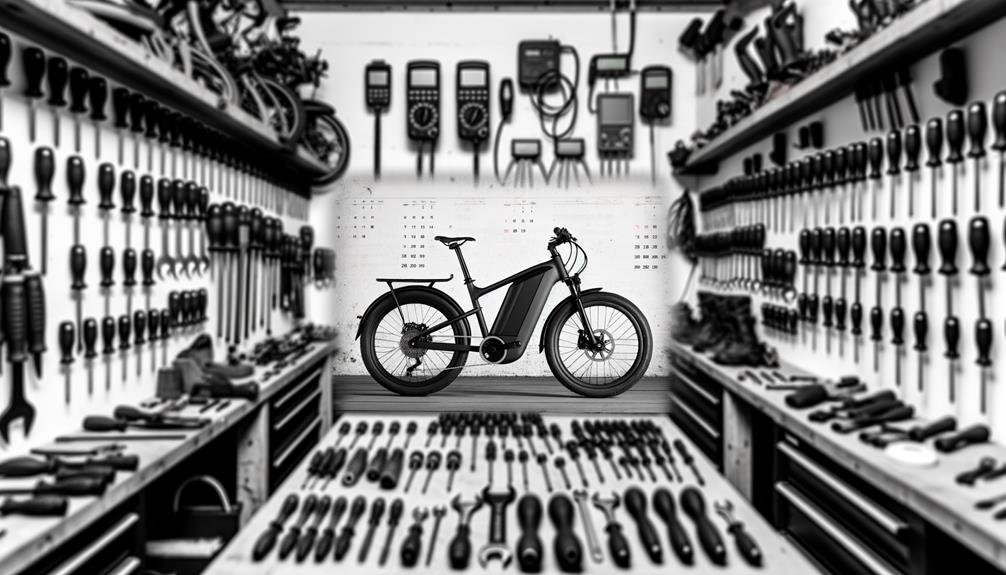Charles Miller is a veteran bike enthusiast with over 12 years of experience dealing with bikes as a mechanic. Despite immense love and expertise for...
We’re often quick to associate transportation with pollution, but did you know that electric bikes might be the exception to this rule? As an increasingly popular mode of transport, they offer an alternative that’s not only efficient but also environmentally friendly.
Using electric bikes instead of conventional vehicles can lead to a significant reduction in carbon emissions. But that’s just scratching the surface. There’s a lot more to these eco-friendly machines that make them a compelling choice for a sustainable future.
Why, you ask? Let’s explore.
Key Takeaways
- Electric bikes contribute to a cleaner environment by reducing carbon emissions and decreasing reliance on fossil fuels.
- They are highly energy-efficient, requiring less electric energy compared to other modes of transportation.
- Electric bikes have a reduced environmental impact, with recyclable lithium-ion batteries and decreased pollution and emissions.
- They offer range and convenience, allowing for longer journeys and eliminating the need for fossil fuel-powered vehicles.
E-bikes: Zero Emission Transport
While they may seem like just another form of transportation, electric bikes are actually a zero-emission solution, significantly reducing both air and noise pollution in our urban areas. As environmentally-conscious citizens, we appreciate the benefits of this sustainable alternative.
Electric bikes, or e-bikes, are a testament to green innovation, serving as a testament to how eco-friendly technology can help reduce carbon emissions.
E-bikes, with their lightweight design and efficient, recyclable batteries, are up to six times more energy-efficient than many other modes of transportation. This efficiency not only helps preserve our roads, reducing the need for constant repairs, but also contributes to a substantial decrease in our personal carbon footprints.
The potential for charging these bikes using green solar power further cements their status as a zero emission transport. By switching to electric bikes, we’re not just embracing a convenient mode of transport – we’re actively participating in shaping a healthier, more sustainable future.
E-bikes and Environmental Pollution
We’re now shifting our focus to the impact of e-bikes on environmental pollution.
The carbon footprint of e-bikes, particularly in comparison to traditional vehicles, is a point we can’t ignore.
Additionally, the role of these bikes in reducing traffic congestion and the subsequent decrease in emissions is a topic that merits our attention.
E-Bikes’ Carbon Footprint
In terms of environmental pollution, electric bikes, or e-bikes, are a game-changer with their zero emissions, significantly improving air quality in urban areas. They’re a sustainable mode of transportation, offering a low-carbon alternative to traditional vehicles.
We’re seeing a reduction in environmental waste, as e-bikes use long-lasting batteries that can be recycled. E-bikes can be charged with clean, green energy sources such as solar power, contributing to a zero-emission footprint.
Beyond the environmental benefits of riding e-bikes, they’ve a minimal impact on our roads, reducing damage and the risk of blackouts. We’re not just talking about 69 electric bikes here, but a potential global shift towards sustainable transportation.
It’s clear, electric bikes offer a loophole for an environmentally-friendly future.
Reducing Traffic Congestion
E-bikes are making a significant dent in traffic congestion, taking up less space on the road and contributing to a decrease in air pollution. They’re an ideal mode of transportation for urban areas, where congestion and pollution are major concerns.
- Emission Reduction: Electric bikes don’t emit harmful toxins, improving air quality and reducing respiratory and other health risks.
- Noise Reduction: By using an electric bicycle instead of a car or motorbike, we can significantly reduce noise pollution.
- Sustainability: E-bikes are a sustainable alternative to cars, reducing our reliance on fossil fuels and lowering CO2 emissions.
In essence, e-bikes help us create more sustainable, healthier, and more livable urban environments.
Battery Life and Sustainability

We’re now turning our attention to the crucial matter of battery life and sustainability in electric bikes.
It’s important to consider both the longevity of lithium-ion batteries used in e-bikes and their less detrimental impact on our environment.
Moreover, the role of proper disposal and recycling of these batteries, as well as the potential for charging them with green energy sources, can’t be underestimated in our quest for a more sustainable future.
Prolonged Battery Usage
Often, the batteries of electric bikes can last from several hours to a few days, providing remarkably long-lasting performance and boosting sustainability. We’re part of a green revolution, where prolonged battery usage contributes significantly to environmental preservation.
- Renewable Energy: We can charge the battery of our e-bikes using renewable energy sources like solar or wind power. This reduces our reliance on fossil fuels, making our rides even greener.
- Off-Peak Charging: Charging our e-bikes during off-peak hours benefits the power grid, optimizing energy usage and promoting sustainability.
- Durability: Our e-bike batteries are durable and produce minimal waste, further enhancing their green credentials.
Together, we’re not just embracing a cleaner commute but also fostering a healthier planet.
Ecological Impact of E-Bikes
Diving deep into the ecological impact of e-bikes, it’s clear that the sustainability of their long-lasting lithium-ion batteries significantly reduces environmental waste and our carbon footprints. That’s one of the reasons that make e-bikes an environmentally friendly choice. Here’s a simple table to illustrate our points:
| E-Bike Features | Environmental Impact | Sustainability |
|---|---|---|
| Lithium-ion batteries | Significantly lower waste | High |
| Battery recycling | Lessens environmental harm | Contributes to environmental sustainability |
| Use of e-bikes | Reduces carbon footprint | Promotes green living |
| Clean and green solar charging | Zero-emissions | Emphasizes renewable energy |
Road Damage Reduction
Switching to electric bikes not only promotes sustainable transportation but also significantly reduces road damage, leading to less pollution and lower maintenance costs. This road damage reduction is a direct result of the lighter weight of electric bikes compared to regular cars and even some regular bikes.
Here’s how it works:
- Electric bikes are lightweight, causing less wear and tear on roads than heavier vehicles. This reduction in road damage means fewer repairs are needed, leading to less use of heavy machinery that often burns fossil fuels and emits toxic gases.
- The conservation of road integrity also results in lower maintenance costs, freeing up funds that can be directed towards other environmental initiatives.
- By reducing the demand for road repair, we indirectly lower the production of asphalt, a process that itself is a major contributor to pollution.
As we strive to switch to sustainable options, the adoption of electric bikes offers a tangible way to reduce our carbon footprint. Powered by human power and clean energy rather than fossil fuels, they’re not just better for the environment than cars, they’re a significant part of the solution to our environmental challenges.
E-bikes and Carbon Footprint

How significantly can electric bikes reduce our carbon footprint? The answer is quite substantially.
E-bikes are powered forms of transportation that emit zero emissions, contributing notably to the reduction of greenhouses gas. They’re designed to use long-lasting lithium-ion batteries, which can be recycled, thus minimizing environmental waste.
When we consider our personal contribution to the tons of carbon dioxide released into the atmosphere, riding an electric bike offers a compelling way to shrink our impact. Compared to cars, e-bikes generate a fraction of the carbon emissions. By choosing this mode of transport, we can significantly lower the metric tons of carbon we put into the environment.
Moreover, e-bikes are up to six times more energy efficient than trains. They place minimal strain on power grids, especially when charged using green sources like solar energy. Not only does this further reduce our carbon footprint, but it also helps conserve our planet’s resources.
In essence, e-bikes and carbon footprint reduction go hand in hand. By riding an electric bike, we’re not just choosing a convenient mode of transport; we’re also making a powerful choice for the environment.
Energy Efficiency of E-bikes
Building on the substantial impact e-bikes have on reducing our carbon footprint, let’s now explore their impressive energy efficiency.
Research has found that e-bikes require less electric energy compared to traditional methods of transportation. In fact, they’re up to six times more energy-efficient than riding trains and 18 times more efficient than SUVs.
- Electric Energy Consumption: E-bikes operate on solar or electric energy, significantly reducing our reliance on fossil fuels which harm our environment.
- Miles Per Charge: E-bikes can travel up to 60 miles per charge. This range not only offers convenience but also contributes to the energy efficiency of e-bikes.
- Long-lasting Batteries: E-bikes use long-lasting lithium-ion batteries that can be recycled, reducing environmental waste.
E-bikes don’t just require less energy; they help improve energy utilization. Unlike a traditional bike, the energy efficiency of e-bikes allows for a cleaner, more eco-friendly mode of transportation.
It’s clear that embracing e-bikes is a step towards a more sustainable future, where we all belong. Let’s continue championing for green technologies that safeguard our environment.
Frequently Asked Questions
How Do Electric Bikes Help the Environment?
We’re helping the environment with e-bikes. They’re efficient, have long-lasting, recyclable batteries, consume less energy, and offer a green alternative to cars. Plus, their production uses sustainable materials, which is a win for our planet.
Why Are Bikes More Eco Friendly?
We’re pedaling towards a greener future with bikes. Their recycling potential, sustainable materials, and lower emissions reduce our carbon footprint. Plus, they ease congestion, save energy, improve health, cut noise pollution and conserve natural resources.
Why Are E-Bikes Beneficial?
We’re reaping health benefits and cost efficiency from e-bikes. They reduce traffic, increase commute accessibility, promote physical fitness, have a long battery lifespan, require less maintenance, and represent progress in innovation. They’re a fantastic choice!
Do Ebikes Reduce Carbon Footprint?
We’re reducing carbon footprint with e-bikes. They offer emission reductions, battery efficiency, and promote renewable energy. It’s sustainable commuting with less congestion. An eco-friendly transport with low maintenance, e-bikes help in reducing pollution significantly.
Conclusion
In conclusion, we’ve found that e-bikes genuinely hold promise for a sustainable future. They offer zero-emission transport, reduce road damage, and their batteries are more sustainable. Plus, they significantly cut down on our carbon footprint.
By using renewable energy to charge them, we can further minimize environmental impact. It’s clear that choosing e-bikes over conventional vehicles isn’t just a good choice, it’s a green one.

Charles Miller is a veteran bike enthusiast with over 12 years of experience dealing with bikes as a mechanic. Despite immense love and expertise for his Tacoma, he rides his Trek Ebike more. Anytime you meet him, you’ll either hear him talking about Bikes, or writing about all things bikes and cars on this blog.
More Posts


